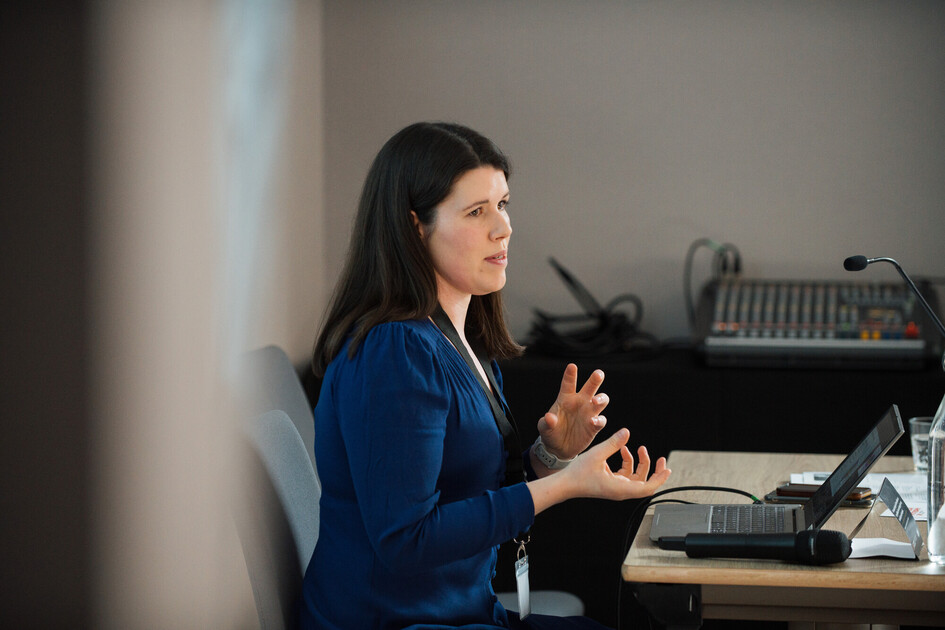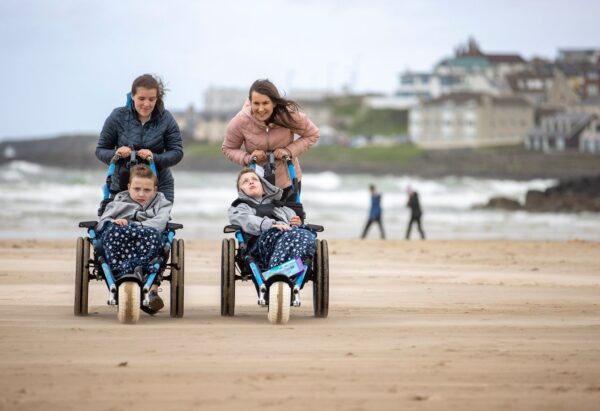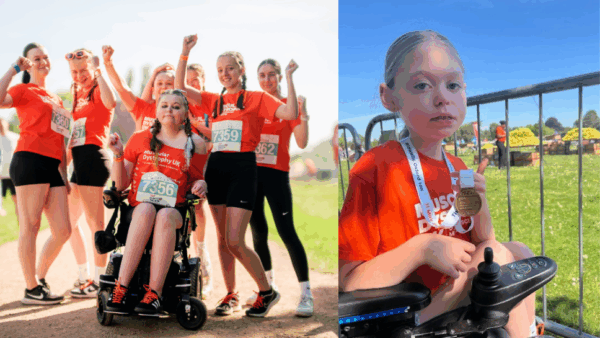Dr Chloe Geagan is a clinical psychologist, working in paediatric neuropsychology at the Great North Children’s Hospital and John Walton Muscular Dystrophy Research Centre. She has experience working with people of all ages, although most of her work is with children and teenagers. Dr Geagan particularly values working with young people with neurological conditions, neurodiversity or learning difficulties. We share some of her insights from a talk she gave at our England information days.
Supporting mental wellbeing for children

When we think of psychology, the thought that often comes into people’s heads is a patient and therapist sitting in a room, talking about how someone is feeling. However, when we work in paediatrics, or with families, rarely do I sit in a room and just have a session with a child.
Whenever I meet a young person, I usually have a referral form with comments about their diagnosis, or physical health condition. I’ll also be given an idea of which teams are involved, and probably a small sentence about their family background. So usually when I meet someone for the first time, it’s asking questions, getting to know the person – what their background is, what’s going on for them, and what’s important to them. We know there are different factors that affect our mental health and wellbeing. There are the physical factors, and then the actual psychological when you think of things like anxiety and depression – the labels we might have for mental health.
Then there is the social side, so things like school, the parent’s work, where a person lives. All these factors come together so we can consider how someone is functioning day to day. Usually if something’s not quite working in one of those areas, it can affect the other things a person is doing.
Mental health and living with a muscle wasting condition
We know that some muscle wasting conditions affect more than just the muscles, such as Duchenne, Becker and myotonic dystrophy, which come with brain involvement and can affect someone’s cognitive ability. The reason that’s important is it can mean different levels of ability, and we might need to adapt what we’re doing as a clinician, as well as what’s needed from a school point of view. So someone might not just need physical support, but adaptations from a learning point of view as well.
That, if you have a physical health condition, you’re still able to work towards those values and do the things you enjoy, even if it looks a bit different.
Unfortunately many young people I work with have difficulties with peers and their school. Not from something they’re doing, just generally teenagers are not always particularly nice. It tends to be around secondary school and high school that these difficulties come up more.
It’s not just a school environment; it’s also about your own community. When we’re thinking of the community background, we’re thinking about practical things like resources and being able to access certain services. The impact this has, not just on the child, but the parents too. Juggling all the things you’re doing on top of having to learn how to speak to lots of different professionals and navigate numerous systems to get access to what your child needs.
“We talk a lot about values. What makes you feel like you. The things you get excited about. Because that’s the stuff that’s super important.”
Procedural anxiety
Even the idea of coming into a hospital or a clinic for young people can be overwhelming. Blood tests are difficult for lots of children, so we do what we call ‘great exposure’ to help build up someone’s confidence around being able to get a blood test. Great exposure is a step-by-step technique used to help overcome phobias, in this case, needle phobia. It involves starting with tasks or situations that someone finds easier to manage, for example, looking at a picture of a needle, before working up to more challenging tasks like holding a needle or watching someone else get an injection, before finally getting blood taken yourself.
“Procedural anxiety is a big one for many children. Things like blood tests and physio assessments.”
Generalised anxiety
There are also generalised anxieties. Feeling anxious about a lot of different things. Like, what’s going to happen tomorrow, what’s happening now. You might see that quite a lot with what we call reassurance seeking – ‘mum, what’s going on? What do I need to do? Do I need to bring this?’
For boys with Duchenne, it tends to be gaining weight from steroids, being shorter than peers, particularly with teenagers when they become more aware of what they look like, which is normal for teenagers but trickier when you have a condition.
Medical anxiety and the unknowns
There might be something that happens in a conversation in clinic when a professional says something. Does that mean X is going to happen? Professionals can’t always give you the answers that you might want, or they just genuinely don’t know, particularly when we think of someone being involved in clinical trials. Every time you’re signing up for something there may be some uncertainty around what might happen.
Behavioural management
Behaviour management, like sleep, eating difficulties, and anger, we see a lot. In relation to anger, a child may be fine in school, and then they’ll come home, and there will be a bit of an explosion, or they won’t do anything they’re asked to. When we talk about behaviour management, it’s more understanding what’s going on across the day. Is it a case that someone’s getting fatigued across the day because they’re being asked to a lot of things? With behavioural management, it’s looking around and saying what is causing this behaviour? What’s happening? Because usually something’s just not working for a young person.
Separation anxiety
For young people just being away from home can cause separation anxiety. Depending on the condition, they might have to rely on adults a bit more and parents tend to be the safe people you know best, so separating from parents can be quite tricky. We have a lot of discussions about being able to support a young person in building up some independent life skills, because that’s what our big goal is – to get someone to be able to advocate for themselves.
A whole system approach
Just thinking about psychology or mental health from a Western world point of view, one to one talking therapy has very much been seen as the best way to support mental health. We’re finally catching up with a lot of other places in the world and now seeing that it’s this idea of a whole system. You’ve got the child factors, what makes your child just your child, the family system, how parents and siblings are doing, and then education and the wider community as well.
If you have any questions about your child’s mental wellbeing get in touch
Webinars, Information Days, and support groups for our muscle wasting community. Our life-changing support is here for you.
Advice for living with or caring for someone with a muscle wasting condition.


